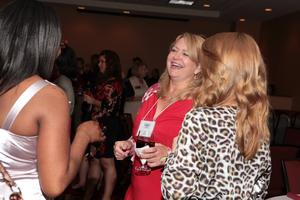
program's opening night.
Military family members who are caring for a wounded warrior or had a spouse or family member die while serving their country have traveled to Florida State University to participate in its first Entrepreneurship Bootcamp for Families (EBV-F).
The 16 participants recently completed the three-week online portion of the program to prepare for the group session in Tallahassee, where they will be immersed in the basics of entrepreneurship. During the group session, which runs until April 18, participants will learn how to run a successful business while caring for a family member who has suffered a disability while serving in the military. Florida State and Syracuse University are the only two universities in the nation that offer the program.
“We tend to focus on the veteran, and deservedly so, but their families have sacrificed along with them,” said Randy Blass, director of the Center for Veteran Outreach and a retired Air Force lieutenant colonel. “So this our way of reaching out to those family members and providing them with an opportunity” to acquire new skills that will ultimately benefit them and their families.
Blass welcomed the boot-camp participants to campus during an opening-night banquet on April 10. There, they got a first opportunity to mingle with one another and share their stories. They also got a taste of what they might expect over the coming week.
“We went over the details of what their days are going to be like,” Blass said. “We essentially told them that they’ll be exhausted at the end, but it will all be good, and to just trust the process and go along for the ride.”
Sponsored by the Center for Veteran Outreach in FSU’s College of Business, the EBV-F program is available to caregivers of veterans who have suffered disabilities related to their post-9/11 military service, as well as to survivors of those who lost their lives. The program integrates training in small-business management with caregiver and family issues, positioning the family member to launch and grow a small business in a way that is complementary or enhancing to other family responsibilities.
The EBV-F is an offshoot of FSU’s successful Entrepreneurship Bootcamp for Veterans with Disabilities (EBV) program, which was launched at Florida State in 2008.
“We saw the power of the EBV program for veterans — some of whom came accompanied by a spouse who is now also a caregiver — and we thought, ‘Let’s also find a way to help a family member run a business, bring money into the home and still be able to care for their spouse,” Blass said. “They are so appreciative that we are thinking about them and showing them the path that will lead to opportunity.”
One boot-camp participant expressed her appreciation at the opening-night banquet.
“Oh, I was so excited (to be chosen for the program),” said Patricia Sands, a small-business owner who traveled from Arlington, Va., to attend. “There’s been a piece I’ve been missing. And I’m just so excited about the connections and the people who are here, and the people who are helping with the lectures and the support and everything. I think this is going to be the turning point for my business really going very well.”
The 16 EBV-F participants include military family members who will be coming from around the nation; among their hometowns are San Diego; St. Louis; Colorado Springs, Colo.; Dallas; Indian Trail, N.C.; and Birmingham, Ala. Many of them already own businesses and are interested in taking those businesses to the next level through what they learn during the EBV-F.
Like the boot camp for veterans, the EBV-F is offered at no cost to individuals accepted into the program, thanks to private and corporate donations. To be eligible, candidates must have an “entrepreneurial perspective,” which Blass describes as being able to view problems as opportunities for entrepreneurship.
Building upon key elements of the College of Business’ successful entrepreneurship curriculum, the boot camp for family members consists of a series of training modules designed to assist participants in growing businesses successfully and profitably. The program consists of three phases:
Phase I: A three-week, online training course in March, during which participants learned the “language” of entrepreneurship and worked toward understanding the fundamentals of business ownership in the context of their own business concepts.
Phase II (April 10-18, 2012): An eight-day entrepreneurship immersion experience at Florida State’s College of Business. Participants are exposed to the “nuts and bolts” of business ownership through a hands-on training program in entrepreneurship and small business, that includes experiential workshops and lessons from world-class entrepreneurship faculty representing nationally ranked programs around the country.
Phase III (April 2012 and ongoing): Participants are provided with ongoing support and technical assistance from faculty experts, experienced entrepreneurs and mentors. This technical assistance program is positioned to help participants realize their entrepreneurial goals.
While the 2012 EBV-F program has accepted 16 candidates, Blass says he is hopeful that increased donations will allow that number to increase to 25 in 2013.
About the Center for Veteran Outreach
The College of Business’ Center for Veteran Outreach serves military veterans pursuing an education in business through recruitment, support and advocacy. In an effort to recruit veterans to the college, the center actively reaches out to those transitioning out of the military, as well as those who have already transitioned, to make them aware of the opportunities available to them. Once the veteran is enrolled at either the undergraduate or graduate level, on campus or online, the Center for Veteran Outreach provides support with resume assistance and veteran scholarships, as well as a private study/meeting area. Finally, the center advocates for student-veterans by assisting with job placement, voicing concerns in higher education, and by sponsoring veteran transition programs such as the Entrepreneurship Bootcamp for Veterans with Disabilities program and research.




